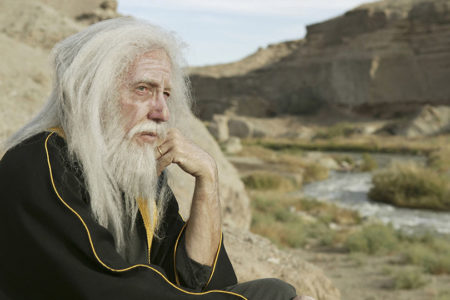Abraham’s Faith
Anyone who has read the story of Abraham would agree he was an ordinary man who was made extraordinary by faith. He stands out in Scripture as a stellar figure whom Judaism calls the father of faith and whom the New Testament calls the “friend of God” (Jas. 2:23).
Moses wrote about Abraham’s faith: “And he believed in the Lᴏʀᴅ, and He accounted it to him for righteousness” (Gen. 15:6; cf. Rom. 4:3, 9, 22; Gal. 3:6). The word believed speaks of Abraham’s permanent, constant trust in God, which was the basis for his ongoing relationship with the Almighty.
When God issued His call to Abraham, Abraham unhesitatingly responded in obedience, fully confident and dependent on God. He believed God’s promises for his future and that God would grant him what He pledged.
As a result, God “accounted it to him for righteousness” (Gen. 15:6). The term accounted means to “impute,” “reckon,” “credit,” or “assign” to someone’s account. Thus God assigned the value of righteousness to Abraham’s trust in Him.
Abraham’s trust and reliance on God should not be considered a deed, act, or work that merited righteousness in the Lord’s eyes. By trusting God, Abraham was not made righteous; rather, God declared him righteous, or assigned righteousness to his account.
God tested Abraham’s faith at least 12 times. These tests paint a picture of how Abraham exercised faith in God’s promises and reveal that his trust in God was genuine.
Step of Faith
Abraham’s journey to a new land was a major step of faith:
By faith Abraham obeyed when he was called to go out to the place which he would receive as an inheritance. And he went out, not knowing where he was going. By faith he dwelt in the land of promise as in a foreign country (Heb. 11:8–9).
When God called him, Abraham immediately left Ur of the Chaldeans, where he had been born and reared, for a foreign country where he knew no one. He was a nomad, living in tents throughout the lands of Shechem, Bethel, Hebron, and Beersheba. The only land he ever owned in Canaan was the plot he purchased at Machpelah to bury his wife, Sarah (Gen. 23:1–20).
His eyes were not fixed on an earthly, temporal city but on a heavenly, eternal one––the New Jerusalem, whose architect and maker was God (Heb. 11:10, 16; 12:22; 13:14; Rev. 21:1––22:5). Consequently, he could wait obediently, with patient endurance, until God’s promises to him would be fulfilled.
Abraham’s faith was great indeed. He not only trusted God for the route he would take from Ur and then from Haran, but he went with no promise of property because God only told him of the land inheritance after he reached Shechem (Gen. 12:6–7). Though Abraham was pledged the land by divine decree, he never took possession of it during his lifetime.
Son of Faith
God had promised Abraham a son in his old age and gave him strength to impregnate Sarah. Abraham was 100 years old and Sarah 90 when their son Isaac was born (17:17). God worked a miracle (Heb. 11:12).
A number of wonderful applications can be made:
- Every Jewish person ever born was conceived because Abraham exercised faith and trust in God’s promise.
- God was willing and able to provide the promised son (Isaac), but He acted on the basis of Abraham’s faith.
- Abraham did not waver at God’s promise but, by faith, claimed the impossible.
- God honored Abraham’s faith and gave him a vast multitude of descendants.
The key to the impossible is faith in God.
Steadfast Faith
Abraham and his descendants clung to the promises of the Abrahamic Covenant: “These all died in faith, not having received the promises, but having seen them afar off were assured of them, embraced them and confessed that they were strangers and pilgrims on the earth” (v. 13).
Although they could only view the promises from a distance, their steadfast faith gave them the assurance and conviction that God someday would deliver what He promised.
If Abraham had yearned to return to Ur, he could have done so:
And truly if they had called to mind that country from which they had come out, they would have had opportunity to return. But now they desire a better, that is, a heavenly country. Therefore God is not ashamed to be called their God, for He has prepared a city for them (vv. 15–16).
The word desire means to “stretch out, yearn and strive after.” Abraham and his posterity had a continual, consuming desire while on Earth for a homeland in heaven where they would be with God because that is what He promised them.
Sacrificing Faith
Abraham’s character and faith were tested to the ultimate degree when he was asked to sacrifice his son Isaac:
By faith Abraham, when he was tested, offered up Isaac, and he who had received the promises offered up his only begotten son, of whom it was said, “In Isaac your seed shall be called,” concluding that God was able to raise him up, even from the dead, from which he also received him in a figurative sense (11:17–19; cf. Gen. 22:1–19).
God told Abraham to take Isaac to Mount Moriah and sacrifice him as a burnt offering. Although Ishmael (born to Hagar) was Abraham’s firstborn son, Isaac was unique and irreplaceable because he was the only son of promise. He alone would inherit the covenant promises passed down from Abraham.
The words offered up (Heb. 11:17) appear twice, first in the perfect tense and then in the imperfect tense. Even though God prevented Abraham from actually sacrificing Isaac, He considered the deed completed and had already accepted it before Abraham had placed Isaac on the altar.
Abraham’s obedience was a great act of faith. He knew God had promised him many descendants through Isaac and must have struggled trying to reconcile God’s command to kill Isaac on the altar. However, neither Genesis nor Hebrews addresses this issue. It seems Abraham left the problem with God (Rom. 4:20–21).
So convinced was he that God could do what He promised that Abraham believed God would raise Isaac from the dead (Heb. 11:19). In fact, Abraham had told his servant, “The lad and I will go yonder and worship, and we will come back to you” (Gen. 22:5).
Abraham must have been convinced that, if God could birth Isaac through two reproductively dead bodies, He could resurrect Isaac from the dead (Heb. 11:12, 19). The phrase also received him in a figurative sense (v. 19) means Abraham received Isaac from the dead, not literally but symbolically.
Abraham is so cherished by the Jewish people that during times of persecution, his example of faith and endurance gave them hope and encouraged them never to renounce their faith in God.
Throughout the ages, Abraham would become the father of faith for believing people worldwide. New Testament writers quote Genesis 15:6 in relationship to salvation. The apostle Paul, for instance, showed that Abraham acquired salvation through faith alone, not by the works of the Law (Rom. 4:3, 9, 22), and quoted Genesis 15:6 to show God accepted Abraham solely because of Abraham’s faith and imputed righteousness to him apart from any meritorious work on Abraham’s part.
James also quoted Genesis 15:6 to show that Abraham’s willingness to sacrifice his son Isaac demonstrated his complete faith in God, proving he was justified (declared righteous) by faith alone (cf. Jas. 2:21–23).









Good and Enjoyed .